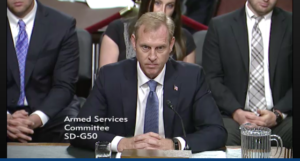WASHINGTON: If there’s one complaint that has sounded a consistent across the Joint Chiefs and Pentagon leadership in recent years, it has been the lack of predictability in year-to-year funding.
If there’s one thing we have learned about President Trump, it’s that nothing is certain until the very end. And even when there’s a decision, it can be flipped, rehashed, tinkered with or forgotten about in the time it take to knock out a Tweet on phone. After two years of budget certainty in 2018-19, the 2020 submission was humming along at $733 billion — until it wasn’t. In late October, the number plummeted (relatively speaking) to $700 billion, until the president was convinced by Defense Secretary Jim Mattis — not yet on his way out at the time — to rocket it up to $750 billion.
But even that number isn’t certain. Most analysts see the 2020 submission settling around the $733 billion level. Visiting US troops at the Al Asad air base on Dec. 26, the president gave the latest vague update. “I mean, I want to see costs come down, too. But not when it comes to our military. You have to have the finest equipment anywhere in the world, and you have that — $716 billion. And this year, again, we’re going to be — don’t tell anybody because nobody else knows — even a little bit higher.”
Whatever the number is, it appears likely that incoming acting Defense Secretary Patrick Shanahan will be the one to deliver and defend it on Capitol Hill in February, as Mattis has been told to leave by Jan. 1. It’s unclear what effect the firing of Mattis will have on the process, or if there will be any significant strategic shifts for the department given the change in leadership.
As budget guru Todd Harrison of the Center for Strategic and International Studies told me this week — specifically in reference to the Space Force, but it really applies across the entire budget — “the thing to keep in mind is that this is, so far, just the Pentagon’s proposal to the White House. It’s not clear if the White House is going to agree to this. The president has a way of sticking to his ideas even if his own administration recommends otherwise.”
Here are a few of the stories we’ve done over the past months breaking down what is happening, and what might — might — happen next.
Mattis Vs. Mulvaney: The Coming Budget Clash & The Reagan Legacy
We have been here before. In 1982 Caspar Weinberger and David Stockman had a similar showdown referred by President Reagan. DOD won that time. What does that have to tell us about the impending showdown between Mulvaney and Shanahan (or whoever comes next)?
$750 Billion Or Bust? Trump’s (Latest) Big Defense Budget Bound For Big Fights
GOP defense appropriators spell out CR funding levels for weapons. Will the DoD listen?
Rep. Ken Calvert and Sen. Mitch McConnell describe the funding tables, obtained by Breaking Defense, as “congressional intent,” and it remains unclear how legally binding the direction ultimately is for the Trump administration.
Few of the experts we spoke to expect the administration to actually see the full $750 billion President Trump will reportedly propose. Between Trump himself calling the figure a “negotiating tactic” and the potential for it driving a $1.2 trillion deficit, the odds are awfully long.
Adam Smith: Doubts $750B Budget, Praises Army, Downplays Yemen War Powers Bill
Incoming House Armed Services chairman, Adam Smith and House Democrats will have a larger say on the budget next year, and Smith has outlined his agenda in a series of a wide-ranging discussions with reporters laced with his trademark tactical snark. While many of his stances were unsurprising — he wants equal treatment for transgender troops, less spending on new nuclear ICBMs, and zero border-wall funding carved out of the defense budget — Smith also hit some nuanced notes we haven’t heard before.
I am certain that, at some time in the future, President Xi and I, together with President Putin of Russia, will start talking about a meaningful halt to what has become a major and uncontrollable Arms Race. The U.S. spent 716 Billion Dollars this year. Crazy!
— Donald J. Trump (@realDonaldTrump) December 3, 2018
Trump Calls For Arms Control, Rips Own Defense Budget As “Crazy”
The Tweet heard around the defense world. The rollercoaster ride of the early 2020 budget season continues, as the president continues to praise and decry high defense budgets, while sacking his defense chief weeks before he was slated to sell the budget on Capitol Hill.































